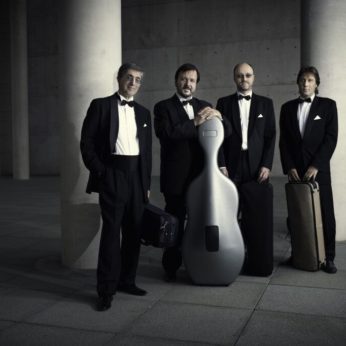Composer: Dmitri Shostakovich (b. 1906 - d. 1975)
Performance date: 02/07/2015
Venue: Bantry Library
Composition Year: 1949
Duration: 00:30:48
Recording Engineer: Richard McCullough, RTÉ lyric fm
Instrumentation: 2vn, va, vc
Instrumentation Category:String Quartet
Artists:
Borodin String Quartet (Ruben Aharonian, Sergey Lamovsky [violins], Igor Naidin [viola], Vladimir Balshin [cello]) -
[quartet]

During the Great Patriotic War against
Hitler, Stalin had loosened somewhat the shackles that restrained the Soviet
artists. Musicians and even writers were evacuated to safe areas to make their
contributions. Shostakovich’s massive Leningrad Symphony became the stuff of
legend and its worldwide performances generated huge radio audiences. Stalin
was only too aware of the propaganda value of Shostakovich.
Nonetheless with the War over the internal
persecution of artists and intelligentsia was revived under the enthusiastic
leadership of Stalin’s ideological watchdog, Andrey Zhdanov. It began in 1946
with the renewed hounding of Anna Akhmatova and culminated in the denunciation
of Shostakovich, Myaskovsky, Khachaturian, Shebalin and Prokofiev in 1948.
Shostakovich lost his teaching job at the Conservatoire, performances of his
published works except the Fifth and Seventh Symphonies were banned and he was
reduced to writing film music in order to survive. When Stalin personally
insisted that Shostakovich lead the Soviet delegation to the Cultural and
Scientific Conference for World Peace in New York his material situation
improved somewhat, though not sufficiently to allow performances of either his
song cycle From Jewish Folk Poetry or
his Fourth Quartet. However his Song of
the Forests won him a Stalin Prize.
The story goes that while Shostakovich was
in
he heard the Juillard Quartet play Bartók’s First, Fourth and Sixth Quartets.
Seemingly he was very taken with the tumultuous Sixth Quartet, written after
Bartók’s mother died, and this inspired him to start his next quartet.
The Fourth Quartet is music of great beauty
and greater sorrow that would grip you by the heart even if you had no idea of
the composer’s circumstances. The opening theme suggests the open spaces and
clear Nordic air of Sibelius. Rather like the Third Quartet, which begins with
a passable imitation of Haydn that gradually disintegrates as the movement
progresses, so here the freshness of the opening theme slowly takes on the
complexities and compromises of Soviet life with much nostalgia for what was or
might have been.
The grief in the Andantino is more personal and immediate, evoking a side of
Shostakovich that will reappear constantly in his later quartets. The first
thirty bars are given to the trio of upper strings, making a dramatic moment of
the cello’s entry. The music now builds gently to a climax before finding its
way back to the elegiac opening and the muted restoration of the trio. There is
an exquisite coda that looks back to the first movement.
The Scherzo
gives a taste of Shostakovich’s black humour and hints of Mendelssohn are now
of course blatantly subversive. It is a delicate movement, unlike some of his
more outspoken scherzos, with the
mutes on throughout and, eventually, it peters out as the viola ushers in the Finale, which follows without a break.
For a brief while the music hovers as if undecided, punctuated only by sinister
pizzicatos, then the Jewish dance bursts out, something like the ferocious last
movement of the E minor Piano Trio, but here the anguish and fury is naked for
all to see and the power is terrifying. This is a huge and burning movement,
throwing the whole weight of the quartet onto this climactic cry of horror.
Then, quite suddenly at the end, in stark contrast to the intensely physical
dance the grief-struck theme from the Andantino
returns and the music dematerialises into a barely audible pianissimo and a plucked string.
The Fourth Quartet is dedicated to the
memory of Pyotr Vilyams, a close friend of the composer, a painter and set
designer, who died in 1947 at the young age of 45. One of his paintings hung in
Shostakovich’s study most of the composer’s life. The Quartet did not get its
public premiere until December 1953, nine months after Stalin’s death.
Copyright © 2024 West Cork Music. All rights reserved.
Designed and developed by Matrix Internet